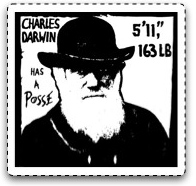
Scientific and educational journals are continuing to celebrate the bicentennial of the birth of Charles Darwin and the sesquicentennial of the publication of the Origin of Species. As NCSE previously reported, Science is allocating a special section of its website to "a variety of news features, scientific reviews and other special content." Similarly, Nature is providing "continuously updated news, research and analysis on Darwin's life, his science and his legacy." A special issue of The Lancet for December 2008, entitled Darwin's Gifts, was "dedicated to Darwin's life and work and the enduring legacy of his theory of evolution" and is freely available in a special Flash-based format. And Evolution: Education and Outreach is devoting the whole year to the celebration. Herewith a sampling of further celebrations in the literature — and let NCSE know of any worthwhile contributions to add!
The February 2009 issue of The American Biology Teacher is focusing on Darwin and evolution, including articles on "The Struggle for Existence: 1859 & Today," "The Influence of Darwin on Evolutionary Algorithms from 'Dinner with Darwin'," "Putting Darwin in His Place: The Need to Watch Our Language," "Spork & Beans: Addressing Evolutionary Misconceptions," "A Suggested Project-Based Evolution for High Schools: Teaching Content Through Application," "Darwin, Earthworms, & Circadian Rhythms," and "Teaching Evolution Through Inquiry-Based Lessons of Uncontroversial Science." Two of the articles — Randy Moore and Sehoya Cotner's "Rejecting Darwin: The Occurrence & Impact of Creationism in High School Biology Classrooms" (PDF) and Paul M. Beardsley, Stephen R. Getty, and Paul Numedahl's "Explaining Biogeographic Data: Evidence for Evolution" (PDF) — are freely accessible on-line.
The American Journal of Botany is celebrating by dedicating a whole issue (2009; 96 [1]), as its editor-in-chief explains, "to one of the number of botanical issues about which Darwin thought and wrote, the rapid appearance and diversification of the angiosperms, his so-called 'abominable mystery.' Invited Special Editors Ruth A. Stockey, Sean W. Graham, and Peter R. Crane have assembled a group of articles that review thinking and research on this subject from approaches as diverse as the history of science, anatomy, morphology, paleobotany, pollination biology, molecular systematics, genetics, and ecology. Authors of these papers variously address traditional or historical understanding of angiosperm origin, spread, and diversification, current thinking on these topics, and unresolved issues to stimulate future research." Subsequent issues of the journal in 2009 will include invited papers addressing botanical topics considered by Darwin.
Current Biology (2009; 19 [3]) features "(Re)Reading the Origin": "Charles Darwin's 1859 book On the Origin of Species is much referenced, especially in this double anniversary year. But, does anyone still read it? And, if so, what is the book itself like as a text? We have asked biologists from a range of fields — evolutionary biologists, but also geneticists, ecologists, paleontologists and molecular biologists — to re-read (or read) The Origin for Current Biology. Below are the responses, contributed by: Andrew Berry, Matthew Cobb, Simon Conway Morris, Jerry Coyne, Hopi Hoekstra, Peter Lawrence, Robert May, Christiane Nüsslein-Volhard, Mark Ptashne, Matt Ridley and Marlene Zuk." The same issue includes a discussion of the celebrations in Darwin's home town of Shrewsbury.
The journal Heredity commemorates the sesquicentennial year of the publication of the Origin of Species with a special issue (2009; 102 [1]) on, appropriately, the genetics of speciation. R. K. Butlin and M. G. Ritchie explain in their editorial introduction, "As we approach the milestone of 2009, the 200th anniversary of Darwin's birth and the 150th anniversary of the publication of the Origin of Species, many questions concerning the causes of speciation remain open and speciation continues to be one of the most actively studied topics in modern evolutionary biology ... the papers in this special issue of Heredity reveal the breadth of current studies into the genetics of speciation. They contain a fascinating mixture of studies of familiar questions and issues in evolutionary biology, as well as new and exciting ideas and insights." All of the articles in the special issue are freely accessible.
And the open-access Journal of Biology (2009; 8 [2]) features Paul Harvey's "Q&A: What did Charles Darwin prove?" — posing and answering various questions about Darwin and his significance to modern biology. Answering the question What was so special about Darwin, Harvey commented, "Any of us can pick up one of his books and read it with ease and for pleasure. And we'll fairly rapidly find places where Darwin's clarity of style reveals errors of logic, and whether those are because we have learned more in the years since he wrote or because he made some obvious mistakes is for us his readers to decide. If we are up to it." In the same issue are Laurence D. Hurst's "Evolutionary genomics and the reach of selection," James F. Crow's "Mayr, mathematics and the study of evolution," Charles F. Stevens's "Darwin and Huxley revisited: the origin of allometry," and Jonathan C. Howard's "Why didn't Darwin discover Mendel's laws?"
